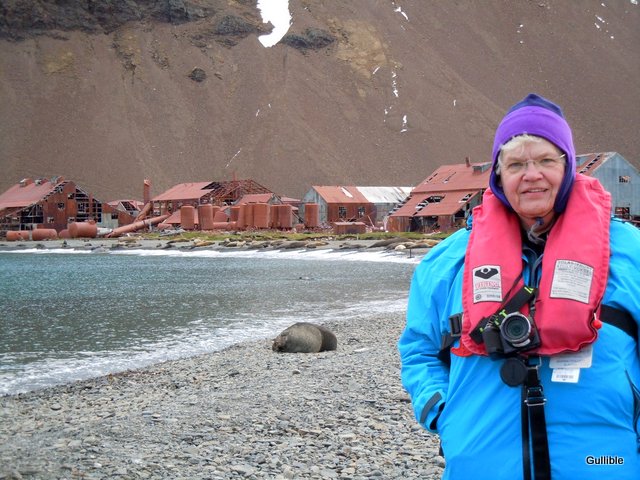Monotony, boredom, and the dwindling food supply settles on
the men of Endurance in Camp Patience. Thomas
Orde-Lees, in charge of supplies, frantically inventories again and again with
the dire prediction that there is only a month’s worth left.
Seals and penguins are scarce on this unstable, slushy
ice. One Jan. 27, 1916, 27 dogs are shot
as they are no longer useful and their pemmican feed is saved for human
consumption. Two men make a dangerous
trip to Ocean Camp and salvage 900 pounds of supplies.
The scarcity of seals and penguins means little fuel for
their blubber stove so hot food is limited to one cup of tea in the
morning.
| Shackleton in leather traces used for dragging life boats across the pack ice. |
A flock of Adelie penguins appears near the end of February
and 300 are taken for food. Their
fat-rich skins are used for fuel. Almost
all the provisions are exhausted and meals consist primarily of penguin meat. Cocoa is gone, tea and flour almost depleted.
The austral winter approaches and the weather turns
bad. Blizzards, gales, and cold bring even
worse conditions to starving men already suffering from wet and freezing
clothing and sleeping bags.
The red line shows where Endurance became trapped in the ice of the Weddell Sea and the men set up camp on the pack ice. The line then turns white, showing the drift and rotation of the ice where the men are stranded.
***
 Access to the Fram’s bridge is on Deck Six, the same deck
where my cabin is located. Occasionally,
I meet one of the ship’s officers leaving the bridge after his watch. The day after "The Storm," as it becomes
known, we meet in the companionway.
Access to the Fram’s bridge is on Deck Six, the same deck
where my cabin is located. Occasionally,
I meet one of the ship’s officers leaving the bridge after his watch. The day after "The Storm," as it becomes
known, we meet in the companionway.
“On a scale of one to ten,” I ask, “How does that storm rank in your experience?” He pauses and I’m wondering if he’s thinking
about other storms he’s encountered or searching for a passenger-correct answer.
“Nine,” he says. That’s a good answer, although I admit I wished he’d said 11 or 12. While we did get hit with some
hurricane-force gusts, they weren’t sustained at that force.
This afternoon’s landing is at Stromness, just a 16 mile
jaunt around a point of land to another bay called, appropriately,
Stromness. Again Fram anchors in calming water. From the ship, we see ruins
of a whaling station built in 1912. It operated
for a couple decades before its conversion into a ship repair station.
| Stromness is the center red spot. Fortuna Bay is at the top right corner of the photo. |
The Polarcirkle boat lands us away from the ruins and we are
instructed to avoid them as they are unstable and might contain hazardous
material such as asbestos.
There are seals everywhere. They line the beach and lumber far inland over
mossy humps and across muddy drainages. Gentoo
penguins and King penguins travel back and forth, oblivious to the seals and
tourists.
These journals will return to Stromness a few chapters hence
as this valley figures large in our adventure.
 |
| Male Antarctic fur seals can weigh up to 460 lbs and be 6.5 feet long. Females weigh considerably less. |
Now though, Fram
anchors here for the night, a treat after several days of rough and rougher
water. We walk about the ship normally, climb stairs the way they are supposed to be climbed, and both elevators are
operational.
No one is likely to be thrown out of bed tonight.
 |
| This guy chose this position. He didn't get tossed there. |
 |
| Gentoo penguins, identifiable by the white band across the top of their heads. |
 |
| Adult King penguin. Immature but fledged King penguins have a yellow ear patch that eventually turns orange. |
 |
| Gully and seals at Stromness |
 |
| This is the first iceberg we've seen. All those lumps on the land are seals. |
 |
| We found it impossible to stay 15 feet away from the penguins. Instead, we stood still when they approached. |
 |
| Gentoo penguins on a mission march. |
 |
| Male fur seals are known to attack humans when they become territorial as breeding season approaches. This Orange Person holds a broomstick in case the seal needs to be dispelled of any such notions. |
 |
| Too early in the season, apparently, as this male fur seal doesn't seem to care. An Orange Person with a broomstick would be stationed near any male fur seals in our path. |
 |
| Back aboard Fram, the boot battle continues for some. |
 |
| For others, the boots come off all too easily, especially when stuck in the mud at Stromness. |











Curious about the reindeer, mice and rats. Is there an ecological or some other benefit to ridding the island of them?
ReplyDeleteThe green moss-looking ground cover looks like it might be slick. Was it?
The green moss ground cover looks to BE DEMANDING that one and all lie down upon it and just snooze away! What wonderful photos ..
ReplyDelete